
The S&P 500 slipped on Tuesday after Federal Reserve Chair Jerome Powell said interest rates may need to stay elevated.
The broad index lost 0.21% to finish at 5,051.41, while the Nasdaq Composite shed 0.12% to 15,865.25. The Dow Jones Industrial Average rose 63.86 points, or 0.17%, to 37,798.97, lifted by UnitedHealth shares. The 30-stock blue-chip index snapped a six-day run of losses.
Stocks were choppy in afternoon trading after Powell said the current state of economic policy should remain in place amid sticky prices.
"More recent data shows solid growth and continued strength in the labor market, but also a lack of further progress so far this year on returning to our 2% inflation goal," the central bank chief said during a panel discussion.
However, the Dow was buoyed by UnitedHealth's rally of more than 5% on the back of better-than-expected revenue for the first quarter. That outweighed fellow Dow member Johnson & Johnson, which fell around 2% on the heels of mixed quarterly results.
Morgan Stanley advanced 2.5% after beating analysts' consensus forecasts on both lines. Bank of America tumbled 3.5% after announcing profit and revenue fell.
America's largest companies have given Wall Street reason for optimism in the early innings of the new corporate earnings season. Of the less than 10% of S&P 500-listed firms that have reported financials, nearly 4 of every 5 have exceeded Wall Street consensus estimates, according to FactSet.
Money Report
But higher rates weighed on investors. The 2-year U.S. Treasury yield briefly spiked above 5% on Tuesday following Powell's remarks.
"Powell moved more decidedly in a hawkish direction," said Quincy Krosby, chief global strategist for LPL Financial. "This was unfriendly for equity markets, but markets got the message."
Traders also monitored tensions in the Middle East after Iran's launch of missiles and drones at Israel on Saturday. The CBOE Volatility Index, commonly referred to as the fear gauge, hovered around 19 after popping in the previous session.
Though the Dow ended its losing streak, the down period has zapped much of its year-to-date gain. That is a major reversal considering it approached 40,000 just weeks prior.
Dow closes higher
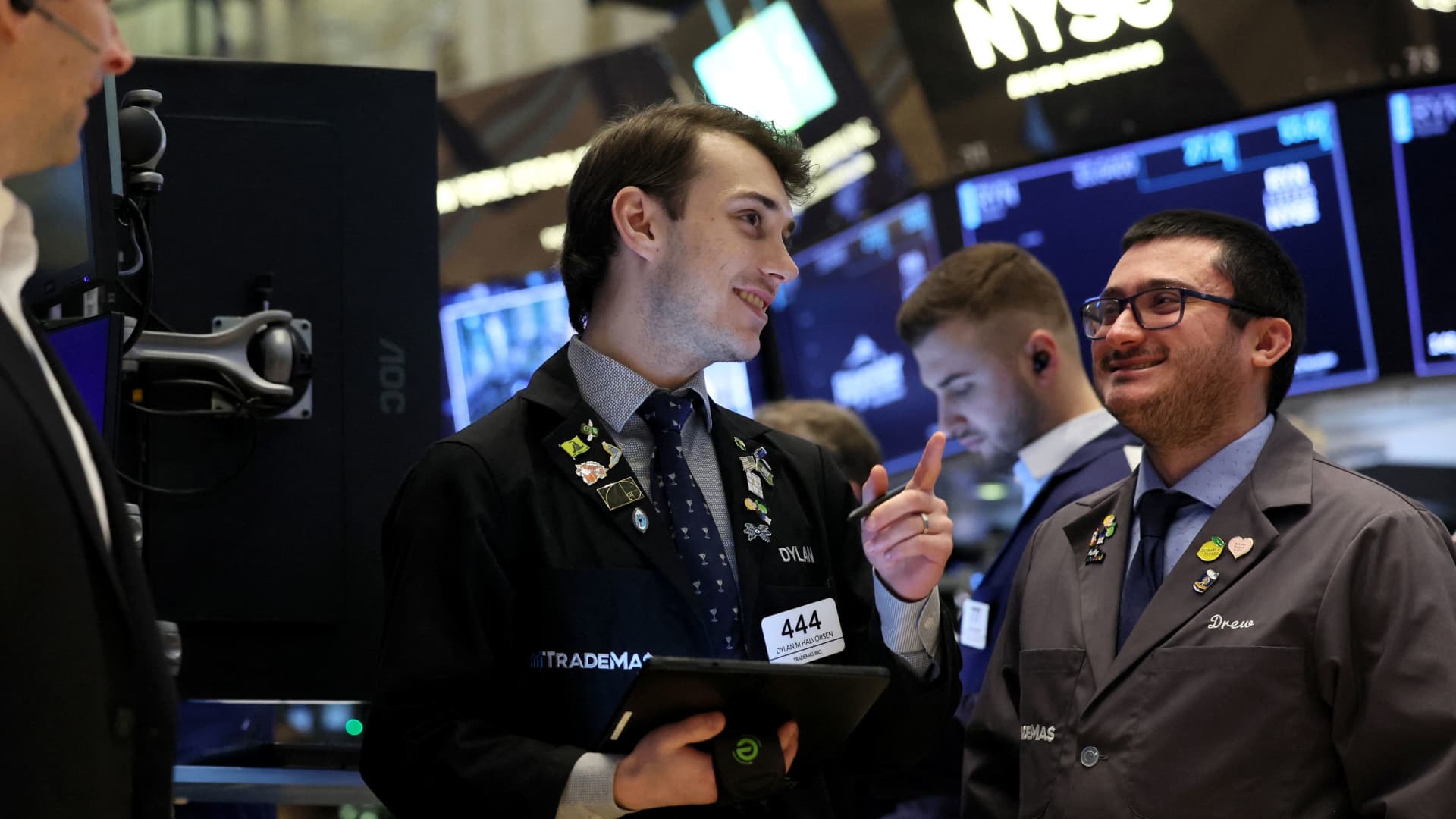
The Dow finished Tuesday higher, snapping a six-day losing streak.
The blue-chip index ended 0.2% up, its first positive session of the last seven. The S&P 500 and Nasdaq Composite closed 0.2% and 0.1% lower, respectively.
— Alex Harring
Boeing shares on pace to break losing streak
Boeing shares could snap a historic losing streak.
Shares fell for 11 consecutive trading days as of Monday's close, making it tied for the stock's longest streak of losses. But the stock is up around 1% Tuesday, putting it on pace to break its downward trend.
Shares have declined more than 12% in April alone and are down around 35% year to date.
— Hakyung Kim
Planet Fitness stock slips after naming new CEO
Shares of Planet Fitness were nearly 4% lower on Tuesday after the company announced Colleen Keating would assume the CEO role effective June 10.
Keating comes to Planet Fitness after serving as chief executive of FirstKey Homes since 2020. Planet Fitness' current interim CEO, Craig Benson, will maintain his seat on the board of directors, the company said.
Analysts were upbeat on the decision despite shares pulling back, however.
— Brian Evans
Information technology stocks among best S&P 500 performers

Information technology was the top-performing sector in the S&P 500, rising 0.4% due to gains from prominent semiconductor and software stocks.
Super Micro Computer rallied 4.5%, while Salesforce, Nvidia, Advanced Micro Devices and Applied Materials gained about 2% each. Other notable gainers included Adobe, IBM and Lam Research.
Three other sectors held gains during afternoon trading, with the health-care sector last up 0.2%. UnitedHealth was the top gainer in the sector, surging more than 5% on the back of earnings.
— Samantha Subin
Semiconductor stocks outperform
Stocks tied to the semiconductor industry outperformed in midday trading, with the VanEck Semiconductor ETF (SMH) climbing 1.1%. Year to date, the exchange-traded fund has advanced more than 25%.
Advanced Micro Devices and Applied Materials were higher by more than 2% each. KLA shares also advanced more than 2%.
— Sarah Min
Real estate, energy among worst-performing S&P 500 sectors
Real estate and energy were the worst-performing sectors in the S&P 500 during afternoon trading, falling about 1% each.
Occidental Petroleum and APA Corporation were the biggest laggards in the energy sector, shedding more than 2% each. Halliburton, Marathon Petroleum and Valero Energy declined at least 1.5%.
American Tower Corporation was the worst performer within real estate, falling 2.3%. CBRE Group, Kimco Realty and Healthpeak Properties lost at least 1.5%.
— Samantha Subin
Powell says rates may need to remain elevated amid little progress on inflation
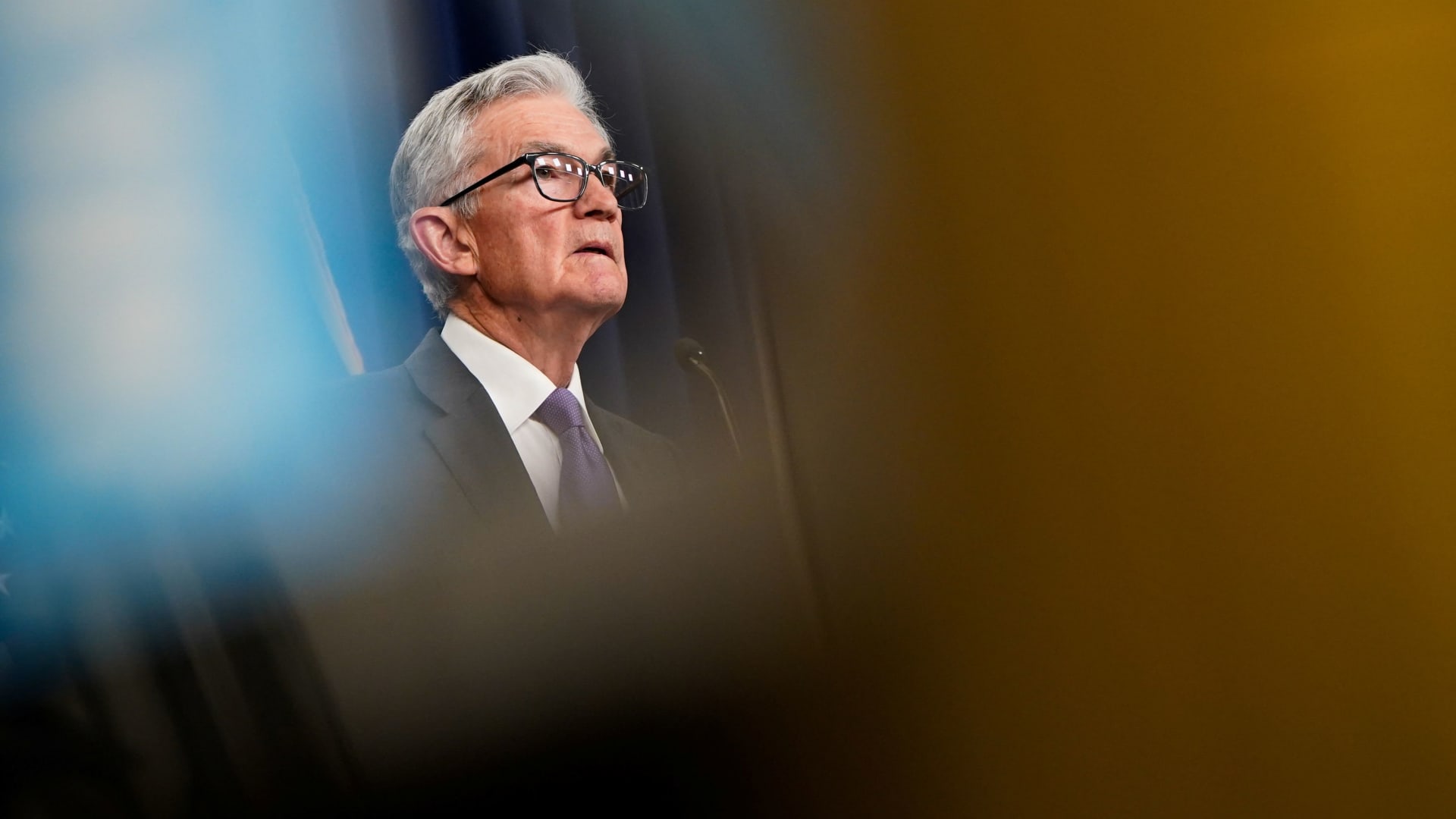
Federal Reserve Chair Jerome Powell said Tuesday that interest rates could need to stay higher for longer as the battle to bat down inflation continues.
Powell said during a panel that there had been little progress on bringing down price growth this year. Due to this, he said monetary policy could need to remain in place.
"More recent data shows solid growth and continued strength in the labor market, but also a lack of further progress so far this year on returning to our 2% inflation goal," the Fed chief said.
"The recent data have clearly not given us greater confidence, and instead indicate that it's likely to take longer than expected to achieve that confidence," he said. "That said, we think policy is well-positioned to handle the risks that we face."
— Alex Harring, Jeff Cox
Trump Media shares slump in midday trading
Trump Media shares dropped more than 10% Tuesday, extending losses from the prior session when DJT shares closed more than 18% lower. The latest move comes after the company announced its Truth Social platform will launch a live TV streaming platform.
Trump Media's majority shareholder is former President Donald Trump, who holds nearly 60% of its stock. Trump is in court in New York for jury selection in his criminal hush money case.
— Dan Mangan, Sarah Min
Stocks making the biggest moves midday

These are some of the companies making headlines in midday trading.
- UnitedHealth — Shares climbed more than 6%, single-handedly pushing the Dow Jones Industrial Average higher on Tuesday. UnitedHealth posted better-than-expected first-quarter revenue and reaffirmed its full-year earnings forecast of $27.50 to $28 per share excluding items. Analysts polled by FactSet forecast $27.50.
- Johnson & Johnson — The drugmaker slipped 2% despite beating first-quarter profit estimates and reporting in-line revenue. Johnson & Johnson adjusted its full-year sales forecast for 2024 to a range of $88 billion to $88.4 billion compared to a previous forecast of $87.8 billion to $88.6 billion.
- SolarEdge Technologies — Barclays maintained an underweight rating on the solar company, saying its fixed costs will weigh on profit margins, helping send the stock down 2%. However, the Wall Street bank raised its price target on SolarEdge to $61 from $50. Shares closed Monday at $60.44.
See the full list here.
— Brian Evans
Iran attack on Israel raises risk in Middle East over long term, Obama national security advisor says
Iran's weekend air assault on Israel has raised the risk in the Middle East over the long term, said Tom Donilon, national security advisor during the Obama administration.
Crude oil prices have fallen over the past two trading sessions, as fears of a wider war have eased after Israel and its U.S.-led allies successfully repelled the attack. But Donilon said the current cycle of conflict is not yet over as Israel will likely respond to the strike.
Iran is now prepared to respond directly, in many cases from its own territory, to any attack from Israel on any Iranian interest or person, said Donilon, who is also chairman of the BlackRock Investment Institute.
"Long term, it is a structural increase in the risk profile," said Donilon. The former national security advisor said he is increasingly worried about the risk of terrorist attacks in the West as the Israel-Hamas war drags on.
"The longer this goes on, I am becoming increasingly concerned about knock-on effects in terms of terrorism here in the United States, especially in Europe," Donilon said. The number of potential threats and plots that were foiled, particularly against Jewish institutions, are very high, he said.
Donilon's comments were interrupted by protestors who called for Columbia to divest from fossil fuels.
— Spencer Kimball
April poised to be worst month so far this year for major indexes
April showers are evident in the market this year.
The three major indexes have pulled back this month, on track for their worst performances since at least the new year began.
The S&P 500 and Nasdaq Composite have both slipped more than 3%. That would mark the worst monthly performances for each going back to September 2023.
The Dow has lagged, tumbling more than 5% thus far in 2024's fourth month. If that holds, it will be the biggest loss in a month since September 2022.
— Alex Harring
Duke CEO says power demand growing at pace not seen since 1980s

Power demand is growing at a pace not seen since the 1980s due to the onshoring of battery and chip manufacturing in the U.S., according to Duke Energy CEO Lynn Good.
"We are seeing demand at a pace that we have not seen probably since the '80s or '90s in the Carolinas," Good said at the Columbia Global Energy Summit on Tuesday. The CEO said demand is expected to grow 1.5% to 2% or more in the near term, compared to flat growth in the past.
"Over the last 18 months, the expansion of demand has expanded far beyond electrification," Good said. The growing number of domestic chip and battery manufacturers as well as data centers supporting artificial intelligence require power around the clock, the CEO said.
Duke is targeting 30,000 megawatts of renewables and 10,000 megawatts of batteries across its system by 2035, Good said. But natural gas will also play an important role in meeting the growing power demand until hydrogen and new nuclear technologies are commercialized, Good said. Gas has helped Duke reduce carbon dioxide emissions by 45% since 2005 as coal is phased out, she said.
"We need a bridge fuel — we used to call it a bridge fuel — we need the fuel to get from here to the future," Good said.
— Spencer Kimball
Health-care ETF rises
The iShares U.S. Healthcare Providers ETF rose 1.4% Tuesday morning.
Alignment Healthcare and UnitedHealth Group led the gains, with both stocks rising more than 6%.
The exchange-traded fund remains more than 6% lower for the month.
— Hakyung Kim
Dow rises at open
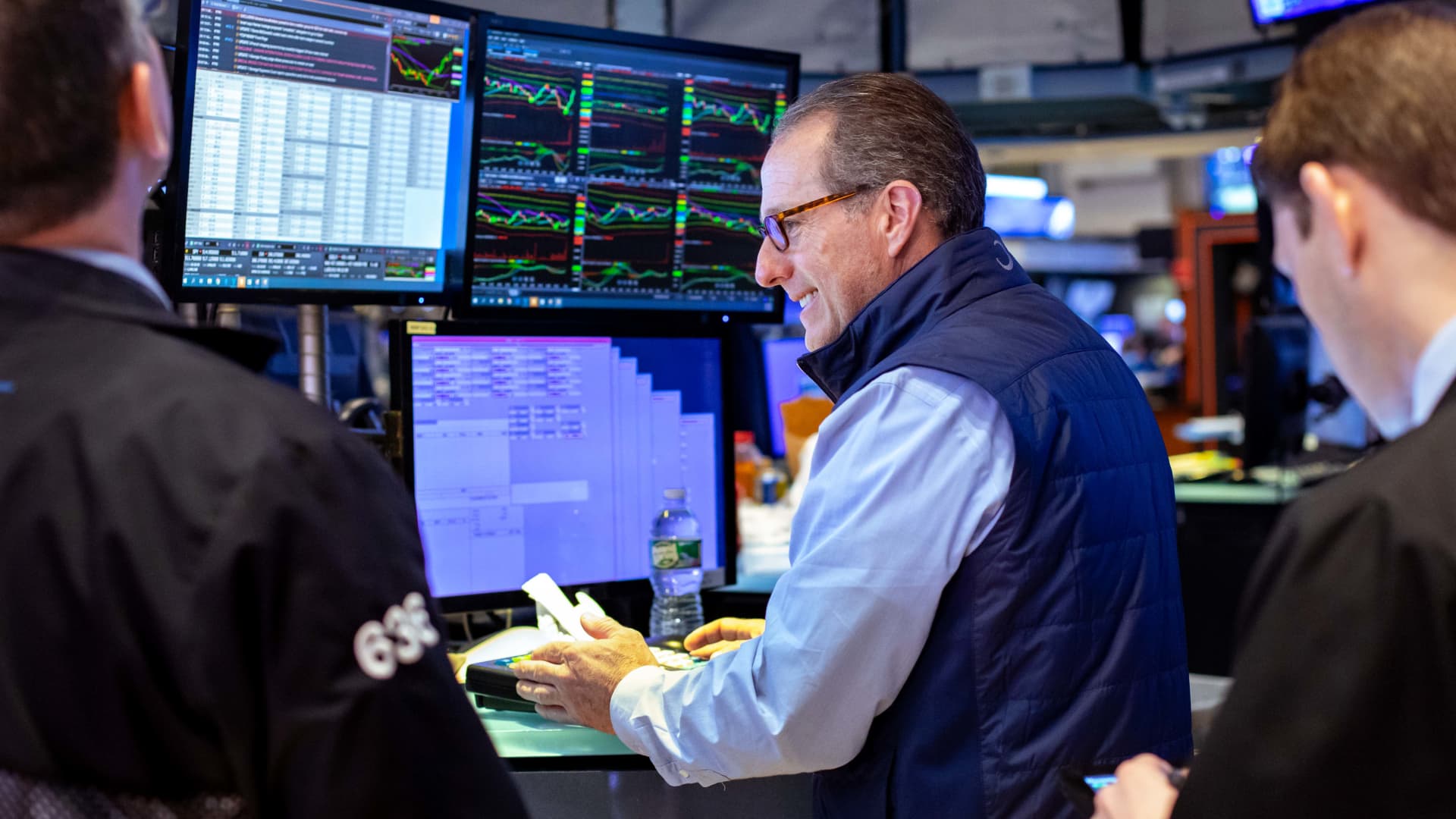
The Dow kicked off Tuesday higher, on pace for its first positive session in seven.
The 30-stock index climbed 0.6% shortly after 9:30 a.m. ET. The S&P 500 traded around flat, while the Nasdaq Composite slipped 0.1%.
— Alex Harring
Industrial production up 0.4% in March, matching estimate
Industrial production rose 0.4% in March, in line with market expectations, though it fell 1.8% for the first quarter of 2024, the Federal Reserve reported Tuesday.
The Fed also said capacity utilization, a measure of total output potential, was at 78.4%, up 0.2 percentage points from February but slightly below the Dow Jones estimate for 78.5%. The measure held below its long-run average of 79.6%.
— Jeff Cox
Fed's Jefferson sees inflation falling as policy stays on hold
Federal Reserve Governor Philip Jefferson said Tuesday that he expects inflation to continue to decline as the central bank keeps its restrictive policy in place.
"My baseline outlook continues to be that inflation will decline further, with the policy rate held steady at its current level, and that the labor market will remain strong, with labor demand and supply continuing to rebalance," Jefferson said in a discussion about how policymaking has changed over the years.
"Of course, the outlook is still quite uncertain, and if incoming data suggest that inflation is more persistent than I currently expect it to be, it will be appropriate to hold in place the current restrictive stance of policy for longer," he added.
Markets currently are pricing in the Fed to stay on hold until September, then slowly begin cutting rates.
— Jeff Cox
Building permits, construction both below estimates in March

Both new construction and permits to build homes missed expectations in March, the U.S. Department of Commerce reported Tuesday.
Privately owned housing starts totaled 1.32 for the month on a seasonally adjusted basis, down 14.7% from February and below the 1.48 million Dow Jones estimate and a 4.3% decline from a year ago. On permits, the total fell 4.3% on a monthly basis to 1.46 million, less than the 1.51 million estimate.
Housing units completed totaled 1.47 million, a 13.5% slide from February.
— Jeff Cox
These are the stocks making the biggest premarket moves
These are some of the companies making headlines before the bell.
- UnitedHealth — Shares popped roughly 7% after the health-care giant posted better-than-expected revenue in its first-quarter results on Tuesday, with growth of close to 9% from $91.9 billion in the same period last year. UnitedHealth reported adjusted earnings of $6.91 per share on revenue of $99.8 billion for the quarter, while analysts surveyed by LSEG expected earnings of $6.61 per share on revenue of $99.3 billion.
- Morgan Stanley — Shares added 3.2% after Morgan Stanley topped first-quarter expectations on wealth management, trading and advisory results. The company reported earnings of $2.02 a share, while analysts polled by LSEG had called for $1.66 a share. Revenue came at $15.14 billion for the period, surpassing analysts' expectations of $14.41 billion.
- Live Nation Entertainment — Shares plunged 9.6% after The Wall Street Journal reported that the U.S. Department of Justice is preparing to file an antitrust lawsuit against the Ticketmaster parent company in the coming weeks.
For the full list, read here.
— Pia Singh
Oil prices fall for second day as U.S. expects limited Israel response to Iran attack

Crude oil futures fell for a second day Tuesday as the U.S. expects a limited response from Israel to an unprecedented air assault by Iran, reducing fears that the Middle East is on the verge of a broader regional war.
The West Texas Intermediate contract for May delivery lost 52 cents, or 0.61%, to $84.89 a barrel. The June Brent futures contract fell 49 cents, or 0.54%, to $89.61 a barrel.
Four U.S. officials told NBC News they expect an Israeli response to Iran's attack to be limited in scope and most likely to involve strikes on Iranian forces and their proxies outside Iran.
"Tensions are high, and either party's next moves are hard to predict, but all the significant signs point toward an easing of hostilities and restraint in the short term," said Jorge Leon, senior vice president at Rystad Energy, a consulting firm.
— Spencer Kimball
Morgan Stanley jumps on earnings beat
Morgan Stanley shares popped in Tuesday's premarket as the financial giant's latest earnings report came in ahead of analysts' forecasts.
The bank posted first-quarter earnings of $2.02 per share on $15.14 billion in revenue. It came ahead of consensus estimates from analysts polled by LSEG on both lines, with the group expecting $1.66 in earnings per share and $14.41 billion in revenue.
— Alex Harring
Bank of America beats on earnings and revenue
Bank of America posted better-than-expected first-quarter results, boosted by strong interest income and investment banking revenue.
The company earned an adjusted 83 cents per share on revenue of $25.98 billion. Analysts expected earnings per share of 76 cents on revenue of $25.46 billion. Net interest income came in at $14.19 billion, beating a StreetAccount estimate of $13.93 billion.
— Fred Imbert
Johnson & Johnson beats earnings estimates, but shares dip
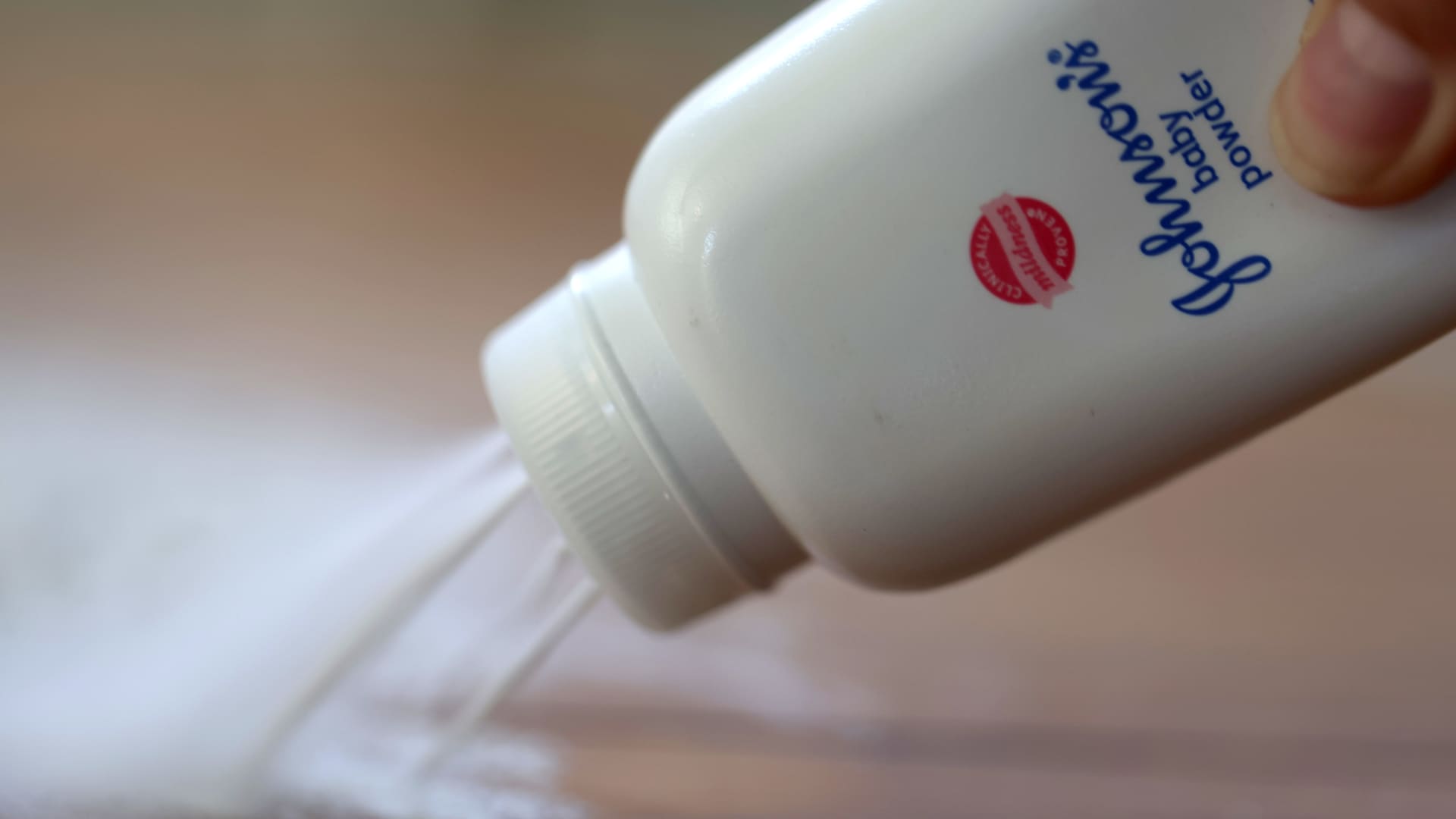
Johnson & Johnson shares were down nearly 1% even after the pharmaceutical maker posted better-than-expected first-quarter earnings.
The company earned an adjusted $2.71 per share on revenue of $21.38 billion. Analysts polled by LSEG expected a profit of $2.64 per share on revenue of $21.4 billion. The company got a boost from strong medical device sales.
— Fred Imbert
UnitedHealth rises on revenue beat
Shares of UnitedHealth were up more than 5% in the premarket after the health insurance giant posted first-quarter revenue that beat expectations.
The company's top line came in at $99.8 billion, exceeding an LSEG estimate of $99.3 billion. UnitedHealth earned an adjusted $6.91 per share, but it was not clear if that was comparable to a consensus forecast of $6.61 per share.
— Fred Imbert
Europe stocks open lower
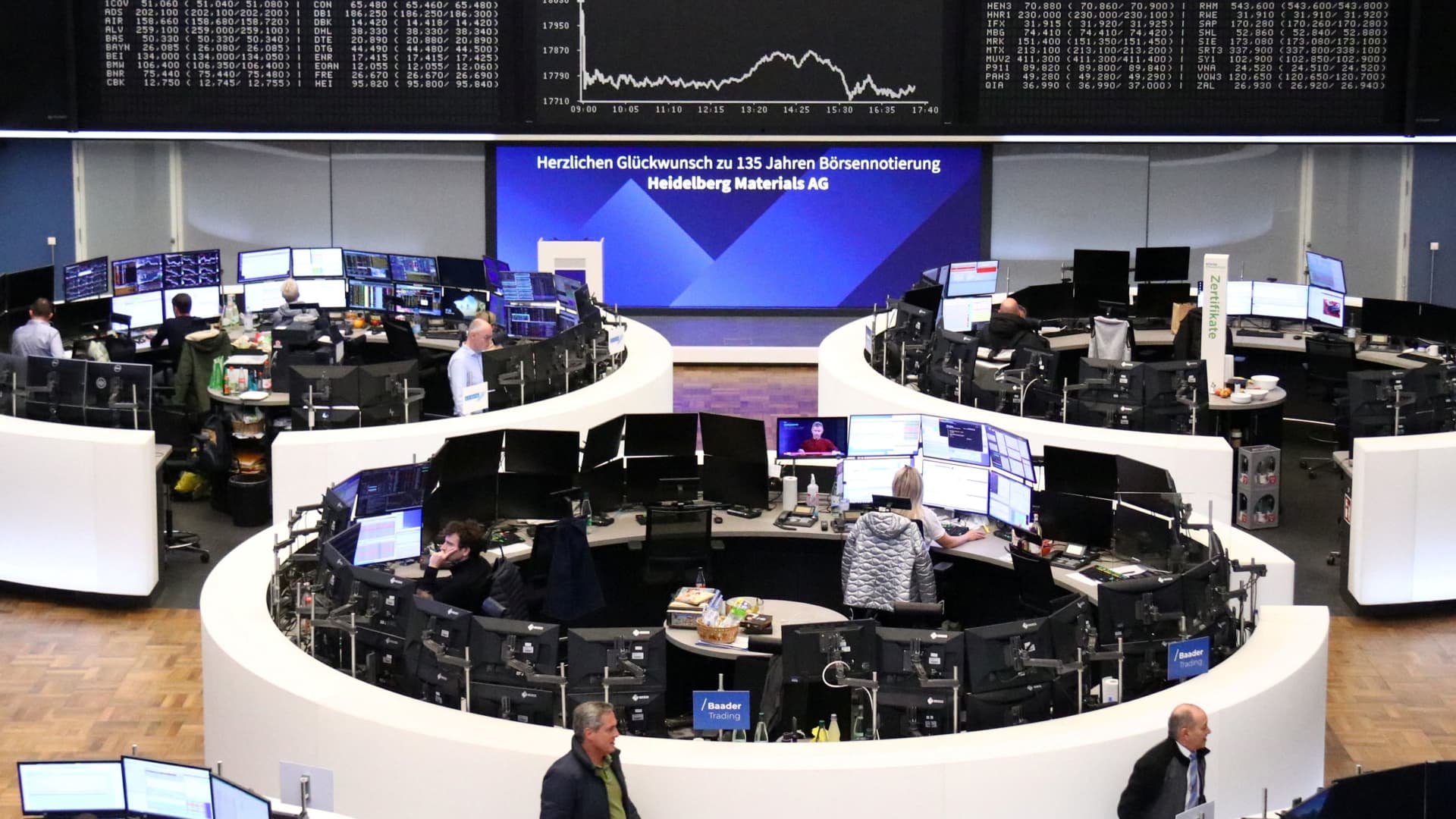
European stocks opened lower Tuesday, with the benchmark Stoxx 600 index down 1.2% by 9 a.m. London time, its lowest level since March 7.
All sectors traded in the red. The U.K.'s FTSE 100, France's CAC 40 and Germany's DAX were all lower by 1.3%.
— Jenni Reid
China's March industrial output and retail sales data miss expectations
China's industrial output for March grew 4.5% year on year, missing Reuters' expectations of a 6% expansion.
China's manufacturing industry grew 5.1% while its mining industry grew 0.2%, according to the National Bureau of Statistics. The country's electricity, heat, gas and water production and supply industry climbed 4.9%.
The country's retail sales, a gauge for its consumption, grew 3.1% year on year, less than expectations for 4.6% growth. The reading also slowed from the prior month's figure of a 5.5% growth.
— Lee Ying Shan
China's economy grew 5.3% in the first quarter, beating expectations

China's economy grew 5.3% in the first quarter compared with a year ago, faster than the 4.6% growth expected by economists polled by Reuters.
Data released by China's National Bureau of Statistics showed that gross domestic product in the January to March period was higher than the 5.2% growth for the fourth quarter. On a quarter-on-quarter basis, China's GDP grew 1.6% in the first quarter.
Beijing has set a 2024 growth target of around 5%.
— Lim Hui Jie
Yen falls to weakest level since June 1990 as it crosses 154 against greenback
The Japanese yen fell to its weakest level since June 1990, crossing the 154 mark against the U.S. dollar.
The yen has been firmly beyond the 150 mark since the Bank of Japan raised interest rates on March 19, with Japanese officials repeatedly saying that "all options are on the table" to counter excessive yen moves.
On April 4, former top currency diplomat Hiroshi Watanabe said authorities will not intervene until the yen crosses 155 against the greenback, according to Reuters.
— Lim Hui Jie
Live Nation Entertainment shares slump after hours
Live Nation Entertainment shares dropped more than 7% in extended trading after The Wall Street Journal, citing people familiar, reported that the U.S. Department of Justice is planning to sue the parent company of Ticketmaster in the coming weeks. The antitrust lawsuit alleges Live Nation has used its power and influence in concert promotion to undermine the competition, the report said.
Live Nation shares have gained more than 6% this year.
— Sarah Min
VIX, Wall Street's 'fear index,' closes at highest since bull market began in late October
The VIX index closed at its highest on Monday since Oct. 30, 2023, suggesting that Wall Street expects more price swings in the days and weeks ahead.
The Chicago Board Options Exchange Volatility Index, known as a yardstick of investor skittishness, ended Monday at 19.23 after rising as high as 19.46, the highest intraday since Oct. 31, 2023.
Sometimes called the "fear index," the VIX has surged since closing at its low for the year thus far of 12.44 on Jan. 11. The VIX has touched successive higher highs for the past three trading sessions.
The last time the VIX was at levels higher than Monday was in late October, just as the current stock market rally was getting underway.
— Scott Schnipper
Stock futures open little changed
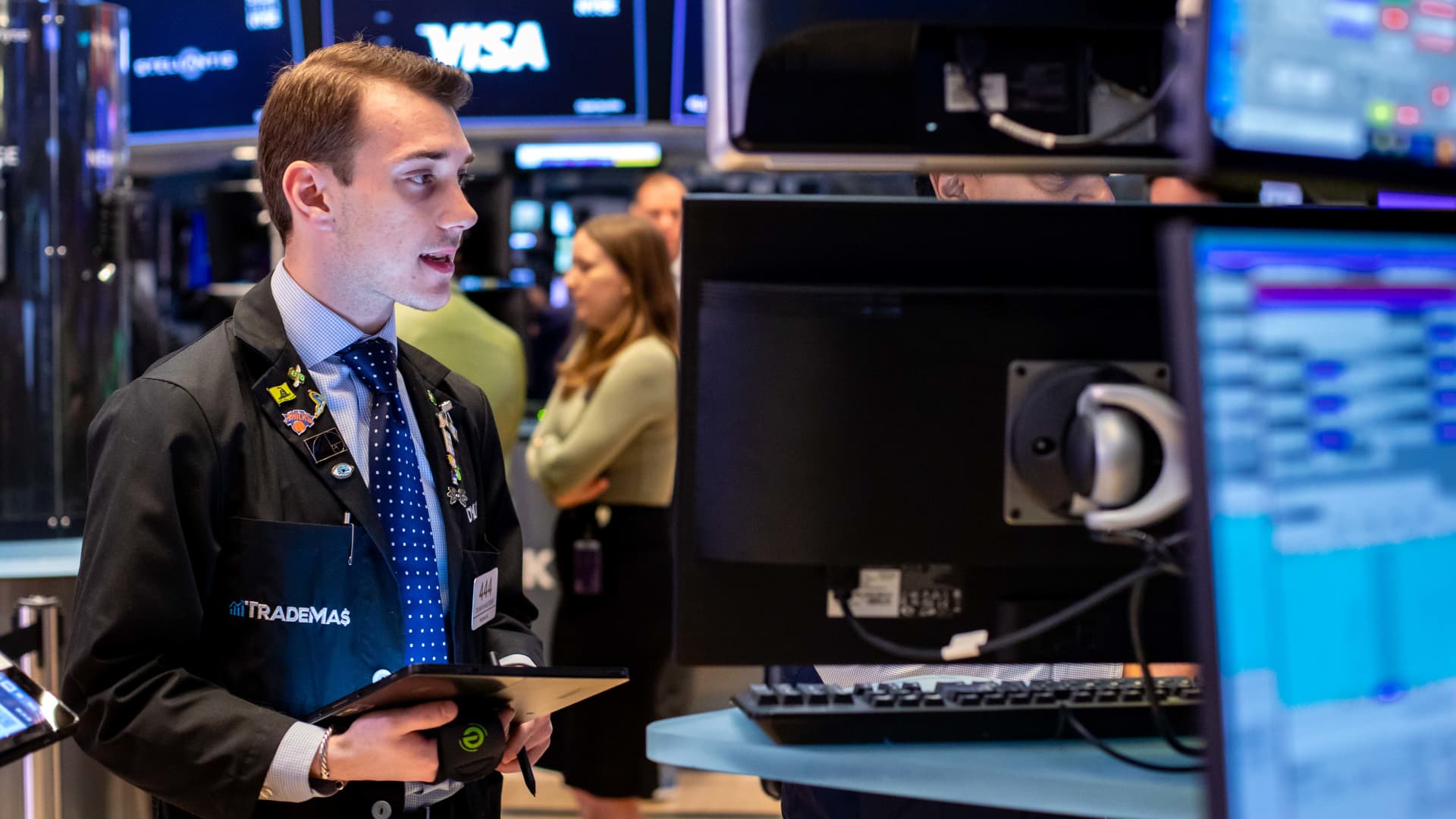
U.S. stock futures opened little changed Monday night.
Dow Jones Industrial Average futures rose 19 points, or 0.05%. S&P 500 futures and Nasdaq 100 futures climbed 0.02% and 0.07%, respectively.
— Sarah Min






